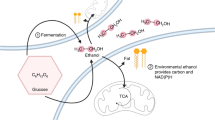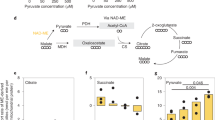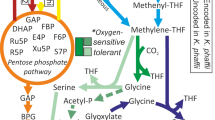Abstract
ETHANOL is known to be one of the end-products of sugar metabolism under fermentative conditions. It is also known that under certain conditions it can be utilized by plant tissues1–3. A number of enzymes have been described from various sources which can catalyse the oxidation of ethanol to acetaldehyde (alcohol dehydrogenase, catalase) and of acetaldehyde to acetate (aldehyde dehydrogenase, xanthine oxidase)4. Some of these enzymes are rather widely distributed in living tissues.
This is a preview of subscription content, access via your institution
Access options
Subscribe to this journal
Receive 51 print issues and online access
$199.00 per year
only $3.90 per issue
Buy this article
- Purchase on Springer Link
- Instant access to full article PDF
Prices may be subject to local taxes which are calculated during checkout
Similar content being viewed by others
References
Cossins, E. A., and Turner, E. R., Nature, 183, 1599 (1959).
Cossins, E. A., Nature, 194, 1095 (1962).
Cossins, E. A., and Beevers, H., Plant Physiol., 37, LXI (1962, Suppl.).
Long, C., Biochemists' Handbook (E. and F. N. Spon, Ltd., London, 1961).
Author information
Authors and Affiliations
Rights and permissions
About this article
Cite this article
CASTELFRANCO, P., BIANCHETTI, R. & MARRÉ, E. Difference in the Metabolic Fate of Acetate and Ethanol fed to Higher Plant Tissues. Nature 198, 1321–1322 (1963). https://doi.org/10.1038/1981321a0
Issue Date:
DOI: https://doi.org/10.1038/1981321a0
This article is cited by
-
Metabolism in plant storage tissue slices
The Botanical Review (1974)
-
On plant alcohol dehydrogenases
Biologia Plantarum (1971)
Comments
By submitting a comment you agree to abide by our Terms and Community Guidelines. If you find something abusive or that does not comply with our terms or guidelines please flag it as inappropriate.



